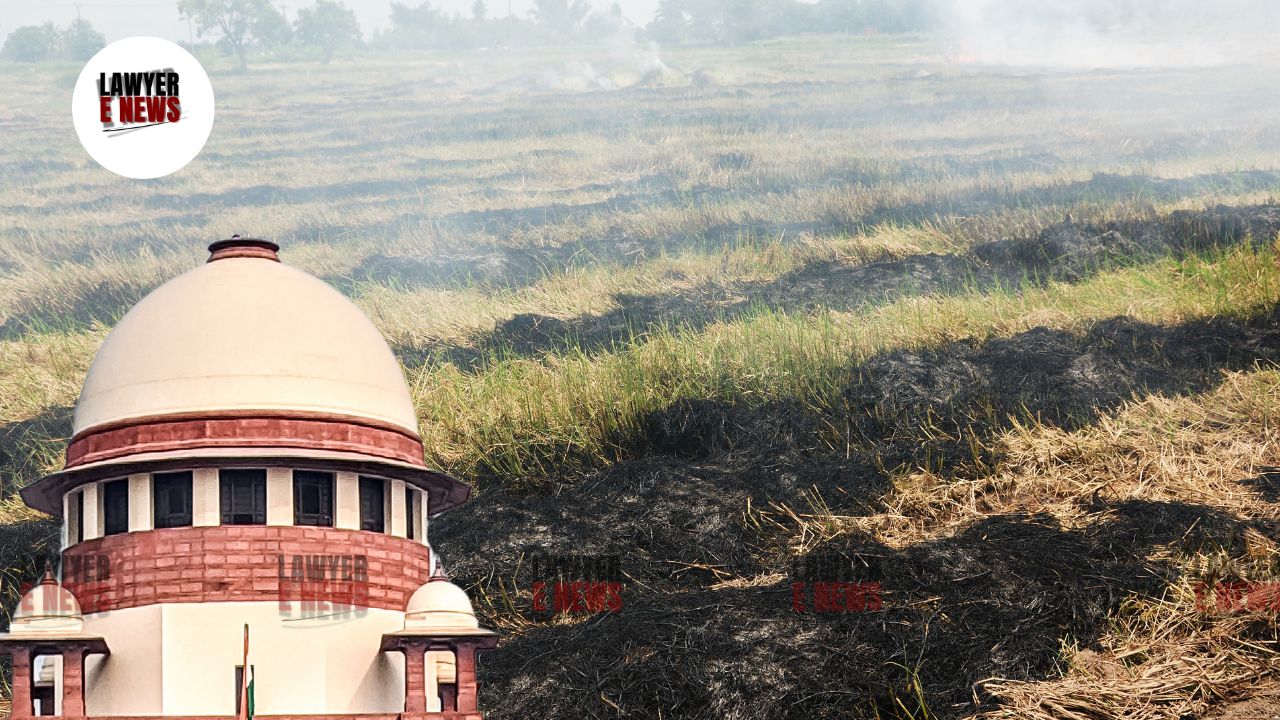-
by Admin
15 February 2026 5:35 AM



Supreme Court of India emphasized that stubble burning in Punjab and Haryana is not just a legal violation but a breach of the fundamental right to live in a pollution-free environment, as guaranteed under Article 21 of the Constitution. The Court underscored the urgent need for government intervention to protect citizens’ health and environment, stating that addressing this issue goes beyond mere enforcement of existing laws.
A bench comprising Justices Abhay Oka, Ahsanuddin Amanullah, and Augustine George Masih made these observations while hearing the long-standing MC Mehta v. Union of India case concerning air pollution in Delhi NCR. The case, specifically focusing on the persistent issue of stubble burning in Punjab and Haryana, has brought renewed scrutiny on the governments of these states for their lack of effective action.
"Blatant Violation of Fundamental Rights": Supreme Court Criticizes Inaction
The Court sternly reminded both the central and state governments of their duty to protect the fundamental right of every citizen to live in a clean environment, observing,
"Time has come to remind the Government of India and the state governments that there is a fundamental right vested in every citizen under Article 21 of the Constitution of India to live in a pollution-free environment."
The bench expressed that the matter was not only about implementing orders and enforcing laws but also about safeguarding the dignity and health of citizens, which are inherent in Article 21. Justice Oka, delivering the Court’s observations, stressed,
"It is not only a question of implementing the orders of the Commission and taking action for breaches of law. The government will have to address themselves to the question of how they are going to protect the right of citizens to live with dignity and in a pollution-free environment."
Summoning of Chief Secretaries and Criticism of State Actions
The Court summoned the Chief Secretaries of Punjab and Haryana last week for their failure to take adequate penal action against stubble-burning violators, despite clear directives from the Commission for Air Quality Management (CAQM). The bench criticized both state governments for selective enforcement, where nominal fines were imposed on most violators, with only a few being booked under FIRs.
Justice Oka voiced strong disapproval of the inaction, remarking,
"So you impose nominal fines. You have given a license to people to commit breach."
Monitoring Without Action: Failure to Enforce CAQM Orders
Both Punjab and Haryana claimed to have appointed officers to monitor compliance with the CAQM’s June 10, 2021, order, but failed to present concrete evidence of actions taken. The Haryana Chief Secretary reported that 5,153 Nodal Officers had been appointed, resulting in a significant reduction in fire incidents—from 9,800 in previous years to 655 this year. However, the Court noted that of the 655 cases of stubble burning, FIRs were registered in only 93 cases, while minimal fines were imposed on others.
The Court raised concerns over the deliberate failure to pursue proper enforcement, noting the lack of machinery under amended Section 15 of the Environment Protection Act (EPA). Justice Oka criticized the Haryana government, stating,
"You are collecting compensation under Section 15 EPA deliberately so that it can later be quashed in appeal… This is all eyewash going on."
Political Reluctance in Prosecuting Farmers: Court's Concerns
The Court also questioned the political reluctance of state governments in prosecuting farmers involved in stubble burning. Justice Oka highlighted that while FIRs were registered in some cases, the governments were hesitant to prosecute farmers due to political considerations. He remarked,
"If these governments are really interested in implementing the law, there will have been at least one prosecution. Advocate General last time has clearly said maybe for political reasons they find it difficult to take action against the farmers. Obviously, it is political. What else is it?"
False Statements Regarding Funds for Farmers: Punjab’s Accountability
In a previous hearing on October 3, the Punjab government had falsely claimed that a proposal seeking funds for tractors and drivers for farmers had been sent to the central government. The Court, in its October 16 order, noted that no such proposal had been submitted. Today, Punjab's Advocate General, Gurminder Singh, informed the Court that the proposal has now been sent to the Union government, and the Court directed the central government to address Punjab’s request for funds within two weeks.
Next Hearing
The Supreme Court’s observations mark a significant shift in how it views the issue of stubble burning—not merely as a violation of environmental laws but as a breach of citizens’ fundamental rights. The case also highlights the Court’s increasing frustration with the selective enforcement of laws by state governments and the lack of meaningful action to address the environmental crisis caused by stubble burning.
The matter is scheduled for further hearing on November 4, 2024, when the Court will assess the response of the Union government regarding Punjab’s proposal for additional funds to support small farmers.
MC Mehta v. Union of India, WP (C) 13029/1985
